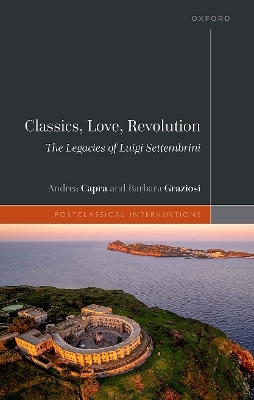
Classics, Love, Revolution
Oxford University Press (Verlag)
978-0-19-886544-5 (ISBN)
Capra and Graziosi intervene in current debates about classics and its relation to revolutionary ruptures, nationalist movements, and identity politics today. They begin with The Neoplatonists, an explicit love story posing as the work of an imaginary ancient Greek author, but actually written by the Neapolitan revolutionary and classical scholar Luigi Settembrini (1813-1876).
Offering the first English translation of the tale—which, because of its celebration of homosexuality, long remained censored and unpublished—they read it in the context of Settembrini's life, scholarship, and revolutionary politics. Drawing strength from his legacies, Capra and Graziosi go on to tackle the nostalgias of post-truth politics today, demonstrating the queer, reparative potential of various strands of classical scholarship. On the basis of archival research, combined with literary and philosophical analysis, they argue that a commitment to social justice and an investment in the study of Greco-Roman antiquity can—and even should—be rooted in egalitarian, embodied, and joyous forms of love.
Classics, Love, Revolution: The Legacies of Luigi Settembrini offers a reassessment of Italian homosexuality, insurgence, and scholarship, while telling a moving story of love and resilience along the way.
Postclassical Interventions aims to reorient the meaning of antiquity across and beyond the humanities. Building on the success of Classical Presences, this complementary series features shorter-length monographs designed to provoke debate about the current and future potential of Classical Reception through fresh, bold, and critical thinking.
Andrea Capra is Professor of Greek Literature at the University of Durham and retains an affiliation with the University of Milan, where he worked for many years. He studied at the Scuola Normale Superiore of Pisa and held fellowships at Harvard and Princeton. He has published widely on Plato, Aristophanes, lyric poetry, the reception of ancient Greece, and the Greek novel. He enjoys writing for a general readership: his Italian translation of Aristophanes' Assemblywomen won the Monselice Prize for translation. His version of the play was staged at the ancient Theatre of Dionysos in Syracuse. Barbara Graziosi is Ewing Professor of Greek Literature and Chair of Classics, Princeton University. Before moving to the USA, she taught at the University of Durham, where she also served as Arts and Humanities Director of its IAS. She has published widely on early Greek poetry, fictional biography, and classical reception. Her first interdisciplinary research project, Living Poets: A New Approach to Ancient Poetry, was funded by the European Research Council; her second, Logion: Machine Learning for Greek Philology is supported by a Princeton University 'Magic Grant'. Her books have been translated into several languages; her essays have appeared in the Times Literary Supplement, the London Review of Books, and Il Manifesto. She regularly contributes to radio and television programmes.
Preface
List of Illustrations
Introduction: Truth and Fakery
1: The Discovery
2: The Intervention
Part I: Autobiography and Revolution
3: Luigi Settembrini, According to Himself
4: Luigi Settembrini, According to His Wife
5: Revolutionary Heroes and Italian Men
Part II: Platonic Fictions
6: The Dialogue on Women
7: The Neoplatonists
8: How to Live and How to Read
Part III: The Neoplatonists: English Translation and Notes
9: The Neoplatonists by Aristaeus of Megara
Epilogue
Bibliography
Index
| Erscheinungsdatum | 09.05.2024 |
|---|---|
| Reihe/Serie | Postclassical Interventions |
| Zusatzinfo | 10 black-and-white figures |
| Verlagsort | Oxford |
| Sprache | englisch |
| Maße | 140 x 220 mm |
| Gewicht | 414 g |
| Themenwelt | Geschichte ► Allgemeine Geschichte ► Altertum / Antike |
| Geisteswissenschaften ► Sprach- / Literaturwissenschaft ► Anglistik / Amerikanistik | |
| Geisteswissenschaften ► Sprach- / Literaturwissenschaft ► Literaturwissenschaft | |
| ISBN-10 | 0-19-886544-9 / 0198865449 |
| ISBN-13 | 978-0-19-886544-5 / 9780198865445 |
| Zustand | Neuware |
| Haben Sie eine Frage zum Produkt? |
aus dem Bereich


